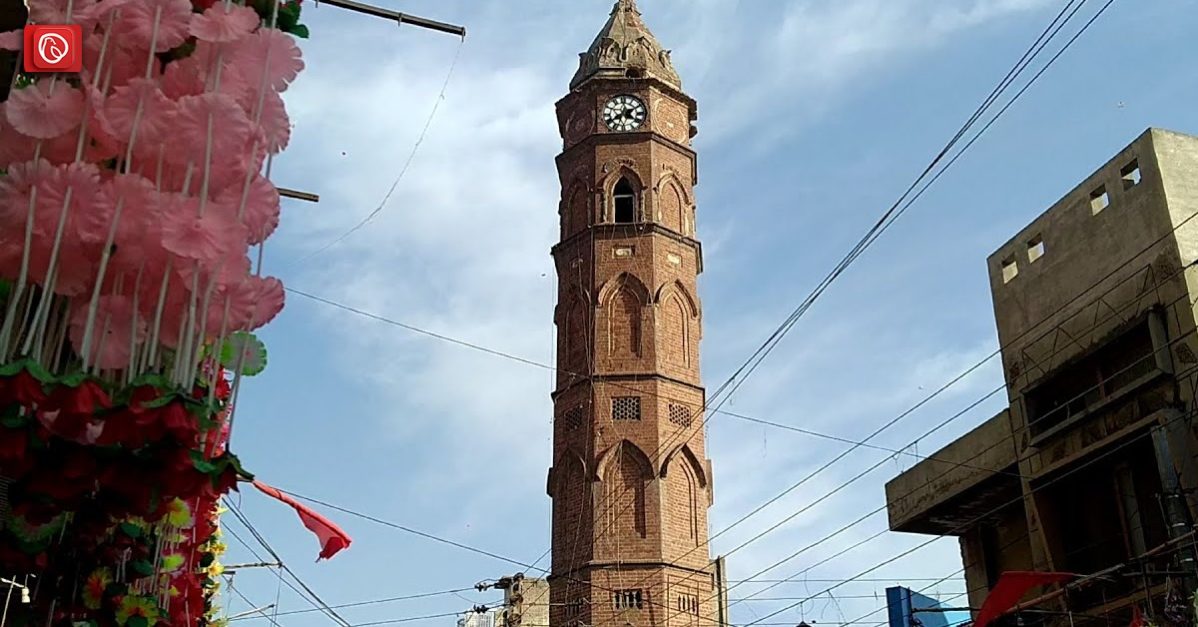
Gujranwala, a city located in Punjab, is home to several historical and cultural landmarks that tell the story of its rich heritage. Among these, Ghanta Ghar Gujranwala stands tall as a symbol of the city’s history and architectural prowess.
In this blog, Graana.com gives a detailed overview of the landmark, including its history, significance and more.
Also known as the Clock Tower is located on Hafizabad Road in Gujranwala, Pakistan. It is a magnificent structure situated in the heart of the city.
It’s towering presence and intricate design make it a popular heritage site, attracting a number of locals and tourists. Built-in the early 1900s during British colonial rule, it has withstood the test of time and witnessed the city’s evolution.
The design is a blend of Victorian and Mughal architectural styles. Its grandeur is evident in its symmetrical facade, adorned with intricate carvings and decorative motifs. The tower stands tall at a height of 70 feet with a clock that has been accurately keeping time for over a century.
Sir Ganga Ram, a renowned architect and philanthropist of the time, was inspired by the architectural marvels of the British Raj. Hence, he also aimed to create a landmark that would serve as a symbol of progress and modernity. He is also responsible for building the famous Sir Ganga Ram Hospital in Lahore.
The construction involved many skilled artisans and craftsmen from the region. Their dedication and expertise are reflected in the carvings on the tower.
Ghanta Ghar Gujranwala holds immense cultural and historical significance for the local community. It serves as a meeting point, a navigation landmark, and a symbol of the city’s identity. The tower’s chimes, announcing the passing hours, have become an integral part of the daily lives of Gujranwala’s residents.
It stands as a reminder of the city’s rich heritage, its architectural splendour, and the resilience of its people. It is not merely a structure; it is a cherished piece of history that continues to inspire and captivate all who encounter its majestic presence.
Over the years, it has undergone various restoration and preservation efforts to maintain its historical significance and architectural integrity. The local authorities, along with heritage preservation organisations, have worked tirelessly to ensure the tower’s upkeep and protection from natural elements and urban development.
The surrounding area has much to offer visitors as well. Nearby markets bustle with activity, selling a wide range of local crafts, traditional garments, and delectable street food. Exploring the lively streets nearby provides a glimpse into the vibrant culture and daily life of Gujranwala.
Ghanta Ghar Gujranwala enjoys a central and easily accessible location.
It is well-connected by roadways, making it easily accessible for both local residents and visitors from neighbouring cities.
For those travelling by train, the Gujranwala Railway Station is the closest railway station to the landmark. From the railway station, one can hire a taxi or an auto-rickshaw to reach the clock tower.
The nearest airport to Ghanta Ghar Gujranwala is the Allama Iqbal International Airport in Lahore.
Visitors can easily find accommodation options ranging from budget-friendly guesthouses to luxury hotels within a short distance from the clock tower. Additionally, there are numerous restaurants, cafes, and local eateries nearby as well.
Ghanta Ghar Gujranwala is open to the public throughout the year. The tower and its surrounding area can be visited during daylight hours. There is no entry fee to visit the clock tower, allowing visitors to admire its grandeur free of charge.
Efforts have been made to ensure that it is accessible to individuals with mobility challenges. The main entrance and surrounding pathways are designed to accommodate wheelchairs and strollers, providing a comfortable experience for all visitors.
Visitors can park their vehicles in the designated parking lots nearby.
Here are some FAQs related to Gujranwala Ghanta Ghar.
It was constructed in the early 1900s during British colonial rule. It was built by Sir Ganga Ram, a prominent architect and philanthropist of the time.
It is a cultural and historical landmark in Pakistan that symbolises the city’s identity. It serves as a meeting point and a navigation landmark, while the clock’s chimes have become a part of the local community’s daily life.
It showcases a remarkable blend of Victorian and Mughal architectural styles. Its symmetrical facade, intricate carvings, and decorative motifs are reminiscent of the grandeur of both these influences.
Unfortunately, visitors are not permitted to climb to the top. However, they can still appreciate its architectural details from the ground.
Yes, it serves as a venue for various cultural events and festivals throughout the year. These events celebrate the city’s heritage and showcase local talent in art, music, and traditional performances.
Yes, it is surrounded by several other historical and cultural attractions that visitors can explore. Some notable nearby sites include the Mausoleum of Sheikh Ahmad Sirhindi, the Gujranwala Cricket Stadium, and Jinnah Park.
Ghanta Ghar Gujranwala stands as a testament to the rich history and architectural brilliance of the city. Its iconic presence has become synonymous with Gujranwala’s identity, serving as a reminder of its past while embracing the progress of the present.
For more information on similar blogs like Ghanta Ghar Multan, visit Graana.com.
ISLAMABAD: Capital Development Authority (CDA) is currently undertaking a major Rs652 million project to upgrade…
Karachi – Mayor Barrister Murtaza Wahab has announced the launch of a citywide anti-encroachment operation…
ISLAMABAD: CDA Chairman Muhammad Ali Randhawa has directed the immediate restoration of 23 non-functional water…
ISLAMABAD: In a major relief for the real estate sector, the federal government has decided…
DHA Islamabad-Rawalpindi (DHAI-R), one of the most trusted names in Pakistan’s real estate landscape, is…
ISLAMABAD: Chairman Capital Development Authority (CDA), Muhammad Ali Randhawa, chaired a comprehensive review meeting on…